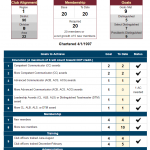Selecting Your Speech Topic
As a toastmaster, we constantly have to come up with new speech topics to write our speeches. One of the most frequent obstacles to delivering a speech is simply getting started, where we often hit a mental roadblock selecting a speech topic. A well-known idiom says “well begun is half done.” Selecting a suitable speech topic makes the job of writing the speech considerably easier. In this article I will share some tips on how I find topics for my speeches.
Places to Look for a Speech Topic
When I need to come up with a speech topic, I find myself drawing inspiration from one of the following places: person experiences, reference materials, brainstorm a topic.
Personal Experiences
Personal experiences is one of the best sources of speech topics. Every one of us comes from different backgrounds, has had different life experiences, have different goals, aspirations, and viewpoints. Personal experiences make for excellent speech topics that help the audience know more about you. They also connect and resonate easily with the audience because despite everybody’s differences, we also share many common experiences—an eccentric childhood friend, an impactful teacher, getting your driver’s license. An added bonus is your personal experiences are yours! You know them intimately well and can frequently talk to them without needing to memorize the details.
I like to categorize personal experiences into current and past:
- Current personal experiences are topics such as your interests, hobbies, family, career, recent vacation
- Past personal experiences are topics like childhood experiences, your first day of school, impactful people in your life
My 10th Competent Communicator speech was about a high school friend who was obsessed about money. In my speech I talked about how we got to know each other, his eccentric behaviours like ironing paper bills (yes bills were not plastic back then!), his ambition and drive to achieve his goal (which he ultimately did), and what he had to sacrifice along the way. He truly was a person who left a lasting impression on my life, and I was able to convey that feeling through the speech.
Reference Materials
If your memory well of personal experiences is coming up dry, reference materials is another place you can turn to for inspiration. By reference materials I don’t mean going to the library to look up the encyclopedia. Reference materials can include newspapers, magazines, books, online articles, interest websites, even podcasts. To expose myself to a variety of ideas, thoughts, and potential speech topics, I try to read a variety of online articles, and listen to different podcasts along my areas of interests. My medium of choice is definitely podcasts, because I spend a good amount of time driving to and from work. Some podcasts that I enjoy include investigative journalism like Reveal, journalism backed up by science and research like Freakonomics, TED, Sidedoor. In fact, my tall tales competition speech about winning the Coney Island Hot Dog Eating Contest was inspired by a Freakonomics podcast episode that interviewed Takeru Kobayashi, a competitive eater who revolutionized the sport of competitive eating. The speech placed third at the Division level 🙂
If you spend alot of time reading online articles, a smartphone app that I highly recommend is Pocket. It allows you to save any webpage then recall them later on your smartphone or tablet after stripping away all the ads, formatting, and noise. It makes for a much more pleasant reading experience. It even suggests other articles you may be interested in based on your reading history.
Brainstorming
If all else fails, and I need to deliver a speech next week, the last technique I resort to is to brainstorm a speech topic. I have a very mechanical way of brainstorming: I grab a pen and piece of paper, and begin writing down any speech topic that floats into my mind. I do not stop or leave my chair until I have written down 20 ideas. Once I have 20 ideas written down, I go through the process of narrowing my selection, which I will describe later. This technique may be mechanical, it may not give the perfect competition-winning speech topic, but it gets the job done and at least I will have a speech to deliver. Like the popular quote says, “If you wait for perfect conditions, you will never get anything done.”
Narrowing Your Selection of Speech Topics
Now that you have a few different ideas or potential speech topics, how do you pick one that will be effective? Here are some criteria that can help you narrow down the choices.
You are Comfortable Talking About
The first (and most obvious) criteria for selecting a speech topic is you have to be comfortable talking about it. You don’t need to be an expert on the topic. But can you at least expand the topic into a 7 minute speech? Going back to my brainstorming technique, once I have a list of 20 potential speech topics, unless there is a standout topic, I select two and begin developing an outline for each of them to see which comes more naturally. I will invariably find one topic that I feel more comfortable with.
It is Specific
In a typical 5-7 minute toastmasters speech, you don’t have alot of time to deliver your idea or message. The most memorable speeches are ones where there is only one central story, one central idea or message, and you develop that story or message from the beginning to the end of the speech. The most famous examples are TED talks, where speeches may be up to 20 minutes long, but they are still focused on only one central idea. A simple test of whether your speech topic is focused enough is can you write down the idea or message in a single sentence? If you can, then it is likely focused enough to be memorable.
Connects With the Audience
At least to me, especially when I first started speaking, “connection with the audience” is one of those vague and mysterious phrases that I’m not really sure what the meaning is (another similar phrase is “leadership skills”). Put differently, do you have close friends or have you met strangers whom you have instantly clicked with? Why do you feel that connection with some people but not others? Invariably it is due to some commonality that you have, perhaps similar childhood experiences, similar culture, similar viewpoints. Connection in a speech is the same. It means the audience can relate to the story or message that you are trying to convey. To achieve this, select topics that are relevant to your audience, or they have some knowledge or experience in. The ideal topic will stretch the audience’s imagination, but relate to them sufficiently to keep them along for the ride.
Summary
In this article I shared some ideas on how to find inspiration for speech topics from personal experiences, reference materials, and from a brainstorming technique that I use. Once you have several potential topics, you can select one that will most likely to be effective by asking yourself: Am I comfortable speaking about the topic for 7 minutes? Is the topic specific enough that I can summarize the story or message in one sentence? Will it relate well to the audience I will be speaking to? If your topic satisfies all these criteria, then you likely have a winning speech topic on your hands.
Happy speech writing!




